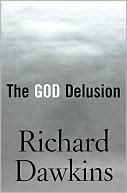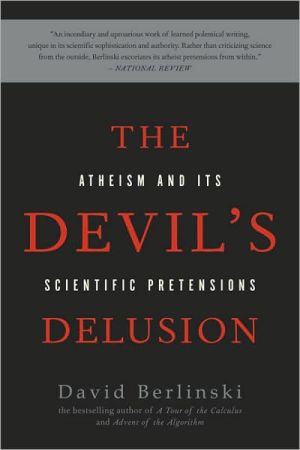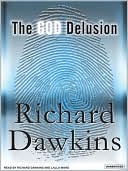Dawkins Delusion?: Atheist Fundamentalism and the Denial of the Divine
2008 Christian Bookseller's Covention Book of the Year Award winner!\ World-renowned scientist Richard Dawkins writes in The God Delusion: "If this book works as I intend, religious readers who open it will be atheists when they put it down." The volume has received wide coverage, fueled much passionate debate and caused not a little confusion.\ Alister McGrath, along with his wife, Joanna, are ideal to evaluate Dawkins's ideas. Once an atheist himself, he gained a doctorate in molecular...
Search in google:
Alister McGrath and Joanna Collicutt McGrath present a reliable assessment of The God Delusion by Richard Dawkins, famed atheist and scientist, and the many questions this book raises—including, above all, the relevance of faith and the quest for meaning. Publishers Weekly When authors write books that criticize other books, they have usually already lost; the original book has set the agenda to which the critics respond, and the outcome is foretold. Not in this case. The McGraths expeditiously plow into the flank of Dawkins's fundamentalist atheism, made famous in The God Delusion, and run him from the battlefield. The book works partly because they are so much more gracious to Dawkins than Dawkins is to believers: Dawkins's The Blind Watchmaker"remains the finest critique" of William Paley's naturalistic arguments for deism available, for example. The authors can even point to instances in which their interactions with him, both literary and personal, have changed his manner of arguing: he can no longer say that Tertullian praised Christian belief because of its absurdity or that religion necessarily makes one violent. The McGraths are frustrated, then, that Dawkins continues to write on the a priori, nonscientific assumption that religious believers are either deluded or meretricious, never pausing to consider the evidence not in his favor or the complex beliefs and practices of actual Christians. They conclude disquietingly: perhaps Dawkins is aware that demagogic ranting that displays confidence in the face of counterevidence is the way to sway unlearned masses. (July)Copyright 2007 Reed Business Information
Introduction1. Deluded About God?2. Has Science Disproved God?3. What Are the Origins of Religion? 4. Is Religion Evil?Notes For Further Reading About the Authors
\ November/December 2007 - Does God Exist?\ "You cannot argue with the McGraths' credentials or the content of this book. It is very well done."\ \ \ \ \ New Man"McGrath identifies Dawkins' flawed arguments with surgical precision. McGrath spotlights Dawkins' embarrassing biblical ignorance and exposes his religion-as-virus-of-the-mind theory as sociological naivete. This intelligent, yet accessible book is a must-read for anyone interested in the subject or for those with friends sucked under by the new current of atheist literature."\ \ \ Christianity Today"One could hardly think of a better apologist for theism than Alister McGrath. This atheist-turned-Christian, also of Oxford, is a professor of historical theology. But as a student of molecular biophysics, he possesses the dual credibility in science and religion that Dawkins lacks. Like watching one schoolboy do another's work, McGrath's true gift is pointing out what Dawkins is obliged to show in order to make his case."\ \ \ \ \ Jim Miller Review"Alister and Joanna McGrath offer a meaty book without all the gratuitous gristle, clearly making their points."\ \ \ \ \ Deinde blog"You cannot help but be impressed with the depth of scholarship which the McGraths bring to this discussion—something markedly different than Dawkins."\ \ \ \ \ M.F. in Libraries Alive"Alister McGrath provides an excellent rebuttal to Dawkin's arguments against God and religion. Scholarly, yes but also very readable for lay people."\ \ \ \ \ Mark D. Barret"[T]he McGraths' book is an effective response."\ \ \ \ \ Cliff Martin"While not exhaustive (by design), the McGraths have offered us a well-reasoned critique of the atheistic arguments of Dawkins, and left us with a cogent description of the inherent weaknesses in The God Delusion. I recommend it to my friends on both sides of this debate."\ \ \ \ \ David von Schlichten"[H]elps theistic people respond more intelligently to the current religion-bashing that has become a source of schadenfreude for some (though certainly not all) nonbelievers."\ \ \ \ \ Enrichment Journal"This book will be warmly received by those looking for a reliable assessment of The God Delusion and the many questions it raised—including all the relevance of faith and the quest for meaning."\ \ \ \ \ "What's New on the Bookshelf" with Shirley Updyke"This book will be warmly received by those who are looking for a real assessment of The God Delusion."\ \ \ \ \ Rowan Williams"Alister McGrath invariably combines enormous scholarship with an accessible and engaging style."\ \ \ \ \ Michael Ruse"The God Delusion makes me embarrassed to be an atheist, and the McGraths show why."\ \ \ \ \ Owen Gingerich"Richard Dawkins's utopian vision of a world without religion is here deftly punctured by the McGraths' informed discourse. His fellow Oxonians clearly demonstrate the gaps, inconsistencies and surprising lack of depth in Dawkins's arguments."\ \ \ \ \ Doctor"With rigorous logic and exquisite fairness, the McGraths have exposed Dawkins's very superficial understanding of the history of religion and theology. Because he is so 'out of his depth' in these areas, Dawkins uses his fundamentalistic scientism and atheism to constantly misjudge the possibilities for dialogue between religion and science. Thank God for scholars like the McGraths who are committed to finding truth in both."\ \ \ \ \ Francis Collins"Addressing the conclusions of The God Delusion point by point with the devastating insight of a molecular biologist turned theologian, Alister McGrath dismantles the argument that science should lead to atheism, and demonstrates instead that Dawkins has abandoned his much-cherished rationality to embrace an embittered manifesto of dogmatic atheist fundamentalism."\ \ \ \ \ David G. Myers"In this crisp and cogent book, Alister and Joanna McGrath note, among other things, how fundamentalist scientism fuels antiscientific Christian fundamentalism. They also remind us of well-documented associations between an active faith and measures of health and well-being. A must-read contribution to today's debate other whether religion spreads dangerous falsehoods or benevolent wisdom."\ \ \ \ \ Does God Exist? November/December 2007"You cannot argue with the McGraths' credentials or the content of this book. It is very well done."\ \ \ \ \ Publishers WeeklyWhen authors write books that criticize other books, they have usually already lost; the original book has set the agenda to which the critics respond, and the outcome is foretold. Not in this case. The McGraths expeditiously plow into the flank of Dawkins's fundamentalist atheism, made famous in The God Delusion, and run him from the battlefield. The book works partly because they are so much more gracious to Dawkins than Dawkins is to believers: Dawkins's The Blind Watchmaker"remains the finest critique" of William Paley's naturalistic arguments for deism available, for example. The authors can even point to instances in which their interactions with him, both literary and personal, have changed his manner of arguing: he can no longer say that Tertullian praised Christian belief because of its absurdity or that religion necessarily makes one violent. The McGraths are frustrated, then, that Dawkins continues to write on the a priori, nonscientific assumption that religious believers are either deluded or meretricious, never pausing to consider the evidence not in his favor or the complex beliefs and practices of actual Christians. They conclude disquietingly: perhaps Dawkins is aware that demagogic ranting that displays confidence in the face of counterevidence is the way to sway unlearned masses. (July)\ Copyright 2007 Reed Business Information\ \ \ \ \ Library JournalIn his 2006 best seller, The God Delusion, Richard Dawkins, who has made his reputation as generally a fine popularizer of science, argued that belief in God is no more than a delusion and that atheism is the only respectable position for a thinking person to adopt. Alister McGrath (historical theology, Oxford; Dawkins' God: Genes, Memes, and the Meaning of Life), originally an atheistic molecular biophysicist, and his wife, Joanna (psychology of religion, Heythrop Coll., Univ. of London; coauthor, Meeting Jesus: Human Responses to a Yearning God), see Dawkins as a brilliant thinker who went down the wrong path with his last book. Combining scholarship with a popular style, the McGraths examine Dawkins's arguments and find them wanting. They do not respond to every one of his points; instead, they show the inadequacy of his argument on the major points, contending that Dawkins's critique of religion is based on hearsay and anecdotal evidence rather than on hard research and that he employs rhetoric rather than rationality. Where Dawkins's criticisms are justified, they have no problem agreeing with him and in fact have nothing but praise for his earlier works. Recommended for all libraries.\ —Augustine J. Curley\ \ \








